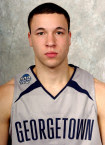
Sports Law Blog reader and fellow Celtics fan Matthew Dinan e-mails a fascinating question that highlights a peculiar implication of the NBA's strict liability rule:
Given that Celtics head coach Doc Rivers is a parent of a potential NBA player--point guard Jeremiah Rivers of Georgetown University--could the NBA fine Danny Ainge and Doc Rivers for sitting next to each other, even though it is a prerequisite of their job?I know the NBA would say it makes an exception in this instance since Ainge and Doc Rivers work together in running the Celtics, but it brings to mind other potential instances that might also, if less clearly, warrant exception.
For instance, say Danny Ainge happens to be friends with former tennis star Yannick Noah. Can they not sit next to each other at a game because Noah's son, Joakim, will be a top 10 pick in this year's draft?
Or how about if Ainge sits next to the parents of BYU basketball star Keena Young to talk about how their sons play together on the same team--Austin Ainge also plays for BYU. Since Young might be drafted next year, would Ainge's seating be a problem with the NBA? Should it be a problem? Where do we draw the line?
Taking it a step further, what's really the point of this rule? It's not like college players become NBA free agents right out of college (at least the draft-worthy ones don't). Can Ainge really brown-nose his way into getting Greg Oden or Kevin Durant or Roy Hibbert or whomever? No. They're subject to the draft. And they will clearly be drafted.
And it's not like getting to know the parents would even help to sign a drafted player--the NBA has a rookie salary scale that determines how much a draft pick will earn based on when he is drafted.
I suppose, as we discussed in last week's post, the NBA might be worried about Danny Ainge encouraging underclassmen to declare. But would that even benefit him in a draft situation, when there are 29 other teams drafting? I guess one could say that every additional top player eligible to be picked makes the draft deeper for all teams, but again, the benefit there seems diffuse . . . unless, of course, you are picking #2, and you know that Greg Oden will go #1, and there is a huge drop-off in talent from Kevin Durant to the next best available player, so you better hope that Durant declares for the draft. Maybe David Stern was right after-all to fine Ainge!





0 comments:
Post a Comment